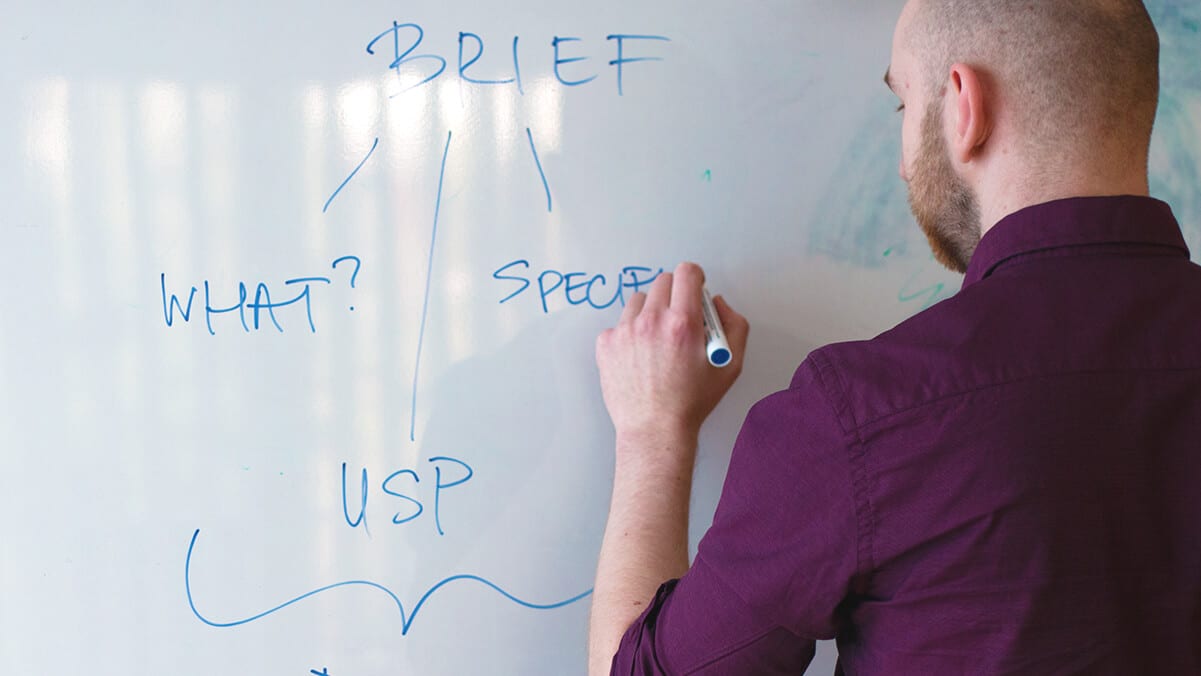Brief is a way of telling people what you want, and if you tell it right, you will get the results you hope for. It is the foundation for your business development and good relationship with your collaborators.
Whatever you think, think again
In one of my favorite books, Paul Arden’s Whatever you think – think the opposite, there is one story which represents something that could be helpful on this subject.
Before 1968, people were doing the high jump with their bodies position parallel to the bar. Everything changed when one little-known athlete revolutionized the jump by flipping over the bar backwards. He was thinking the opposite and his way of thinking became his, and consequently, everybody’s technique for jumping.
He changed the process and got better results. That doesn’t mean you should change the way you think and write, but read, research, ask for advice and opinion, because that way you can get even better. You have to question yourself and try to think differently so you can develop yourself even more.
Sometimes it is not all about the results, there is something about the process.
The purpose of a brief
The main purpose of a brief in a client – digital agency relationship, is to give as much information as you have. Bear in mind that you have to give the right information in the right way, so the agency can help you in creating a solution faster and with good results.
If your brief is good, you will have a good outcome. That’s why you have to be exact and pretty clear when you are writing it.
I have read and written over a hundred briefs, and trust me you need time and patience for every one of them. It is not that easy to write one.
To help you with your next brief, I’ve prepared 5 tips, and for those of you who can’t live without examples, scroll on, I’ve got you covered.

5 tips for creating a brief
1. Know what you want to say
It all starts with your goals. Deep inside we all know what we want to achieve or what our business goals are. But there are times when we don’t know how to express ourselves and don’t be afraid, that is one part of the process. It may happen that we don’t know what to say or we just don’t know how to say it.
We have two options, either we should consider to get more familiar with the subject, doing some more research or gather some more information and better insight, or develop ourselves in the field of writing. On the other hand, maybe we should consider involving someone to help us express ourselves, people that can ask us the right questions and help us to create (both tell and write) a story.
In the end, it is important to have in mind that the outcome should be the right information, for the right purpose.
2. Be specific
If your brief is specific, it is more likely that the outcome is going to be to the point.
Nobody will give you what you expect if you can’t express your expectations. You are the one that has the most valuable insight about your business, information that you understand, and you need to find some time to share it with others through a project brief. Excuses like – “I don’t have time”, “But that is such a small project”, “They know us very well so they will know what to do” etc. are just going to prolong the process of getting the best solution to your problem.
How do you know if you are specific enough? You don’t, but you can practice. Try to give a person as much details they need, make a clear information structure that is easy to navigate, or even show them what you think by pointing some of the most representative examples.
And remember, clear and specific directions and purpose in a client-agency relationship are going to give you back your lost time… and we all know that time is money.
3. You are not writing it for yourself
Put yourself in the shoes of someone who doesn’t know your company even exists. Provide enough detail and try to be clear about your expectations. You should know that your agency knows how to do business but doesn’t know you and your company that well (yes, that is totally normal). So, use the brief to present yourself, not only to tell people what you want to achieve but what you do, how you do it and why. That way, your agency can help you to get to that point.
4. You need to know what your unique selling point is
You are the one who holds the keys. Every business is specific, even when we talk about the same industry or the same type of products. Remember, it all starts with you. Use that thing that differs you from others and find the right people to help you present yourself and your unique brand. Do it well and soon you’ll have someone who knows your business even better than you do. And remember — it all started with a good brief. 😉
5. Ask for feedback
Okay, you made it, you created a brief. But it doesn’t end there. Ask for feedback, organize a meeting, or two or three. When you have a good brief it doesn’t mean it’s all over, the brief is just an initial phase of one big process.
In the end, here’s a little something extra for all you template-lovers.
We in Degordian have our project brief template and we decided to show it to you! We hope this will motivate you and give you some useful information for your future work.
You can download our project brief template right here. Let the brief be with you!



